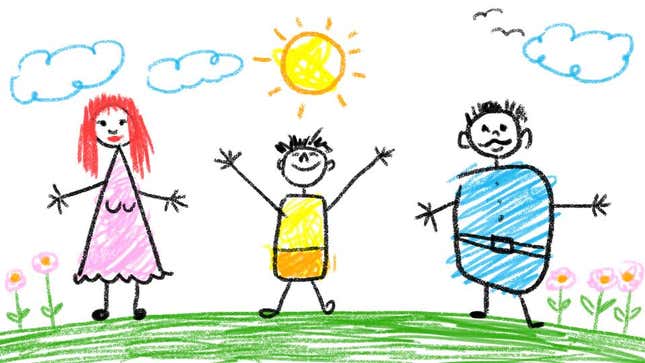Stop Saying Only Children Will Grow Up to Be Selfish Monsters
Latest

Only children are so easy for people to hate. They are, as the caricature goes, spoiled from having been loved and provided for too much, without having to endure the character-building benefits siblings provide: being ignored, being forced to jockey for the TV remote, enduring the humiliation of hand-me-downs, and all the other resource-competitive hard knocks that allegedly make you a better person by virtue of being occasionally ignored.
If you’re a parent of just one child, the American two-child dream (™) requires other people—strangers, teachers, acquaintances—to ask and ask often if you’re going to have another. “Bus is full,” you learn to reply, but the conversation cannot stop there. No, you are now obligated to parse the pros and cons of having one kid or more to show that you understand the weight and responsibility of your decision, the implicit air of selfishness it embodies within it, as well as proof of your own self-reflection as a person who has dared to swim against the tide. Although just under a quarter of American families have one children—and the number rises in metropolitan areas—it’s still seen as an anomaly, and generally, the following points/excuses must be made by you at some point in the conversation:
- Yes, I know what people say about only children being self-centered, lonely, and maladjusted.
- But hey, it’s not like all siblings get along so hot!
- There’s a lotta bad feelings sometimes! There’s competition and resentment!
- Plus, I mean, I feel like I got lucky. I had this one pretty great kid, what if the second kid is like a serial killer?
- I don’t want to tempt fate.
- Plus, I think I can still impart some communal values like compassion and civic-mindedness with one kid—probably even better than I would otherwise, because I have more time on account of not having two children.
- In a city like Los Angeles, having two is just too expensive, one is manageable.
- Even if I lived somewhere easier/cheaper I would probably still just have the one though.
- I feel like I know my limits as a parent and they fit perfectly with this one kid.
- But hey, two kids do seem PERFECT!
- Even though I know a lot of dicks and they are not only children per se!
If the other person has more kids, and they usually do, they will continue this conversation ad nauseum by offering up a series of defenses for how two or more kids is actually great, not so bad, actually easier than one because by the time you have a second one you’re an old hand and the two siblings occupy each other (LOL, uh-huh), or how it all balances itself out because two kids is the universe’s idea of sheer procreative symmetry. (OK, no one ever says that last thing, but I wish they would. It would be a new argument for once.)
But I wish we could just accept that only children, just like children with siblings, can either be awesome or terrible, and that, just like with anything related to parenting, categories are not definitive. “Only” is an important adjective in front of “child,” but it’s not the most important one. Which is why I was pleased to read a thing at Vice where Mike Pearl talked with two experts on only children—Dr. Toni Falbo and Dr. Carl Pickhardt—who help suss out what only children are really up against, at least according to the research.
It turns out that not all only children are the golden demon spawn of helicopter parents who intend to dote them straight into a life of indulgence and alienation. There are good things and bad things about being an only, just like there are good things and bad things about having siblings. It’s not shocking, yet it must be repeated until the parents of only children stop feeling that they must reflexively defend their position. Yes, sometimes the child is the only shot at parenting so the parents do throw all in to get it right, Pickhardt notes. But Falbo counters this with another common scenario: some only children are accidents, or results of parents not caring too much about having children, so you don’t see the overbearing resource-dousing.
The interview remains magnificently even-handed from there on out. For instance:
-

-

-

-

-

-

-

-

-

-

-

-

-

-

-

-

-

-

-

-

-

-

-

-

-

-

-

-

-

-

-

-

-

-

-

-

-

-

-

-








































